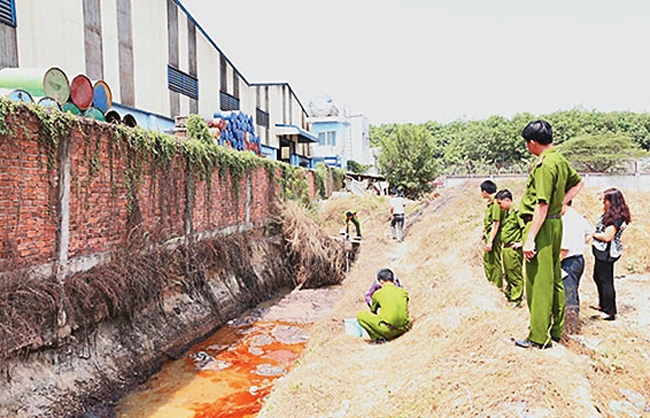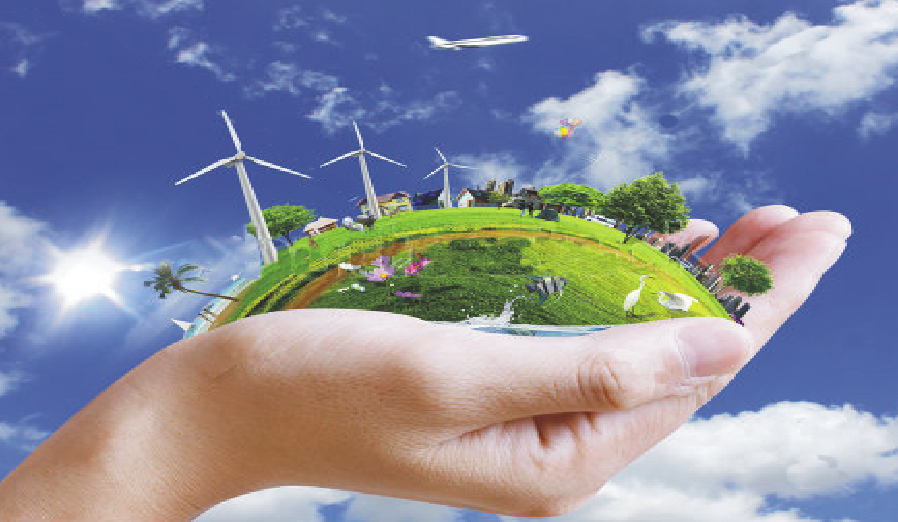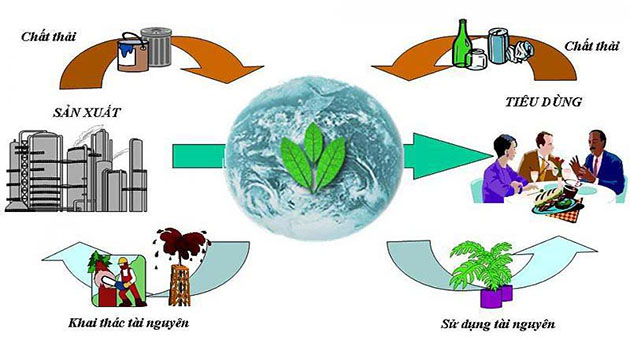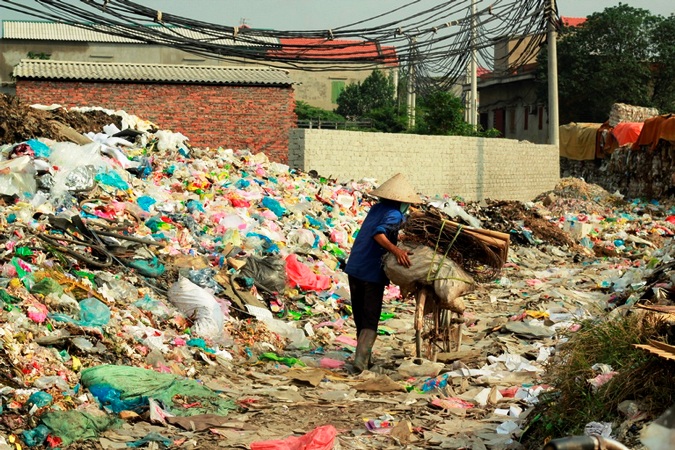Vietnam: Perfecting environmental laws to ensure sustainable development
Environmental law is an important branch of law in the Vietnamese legal system. Since the birth of the Democratic Republic of Vietnam until now, along with the perfection of the legal system, environmental law has also been increasingly paid attention to, consolidated, developed and perfected.

Since the beginning of the renovation and opening up, our Party has paid attention to the issue of environmental protection, recognized and affirmed in the Documents of the VIII, IX, X, and XI Party Congresses, the Constitution of the Socialist Republic of Vietnam (supplemented and developed in 2011), in the Resolution No. 41/NQ-TW dated November 15, 2004 of the Politburo of the 9th Congress on environmental protection in the period of industrialization and modernization of the country, as well as Resolution No. 24-NQ/TW of the Central Committee of the Party on the protection of natural resources and the proactive response to climate change in 2013.
These views have been institutionalized in the Constitution 2013 and the Law on Environmental Protection 2014 of Vietnam by enshrining the right to live in an environment for the first time, with specific regulations on the protection of natural resources, the environment, and the proactive response to climate change, etc., which contributes to bringing sustainable development into reality in a more effective direction. However, in the context of building and perfecting the rule of law as well as the trend of opening up and integrating into the region and the world today, many issues about improving the law in general, environmental law in particular have been raised.
Perfecting environmental laws towards sustainable development
On a theoretical side, the concept of sustainable development was introduced internationally in the 1980s and was officially recognized in the 1992 Declaration on Environment and Development at the United Nations Conference on Environment and Development in Rio de Janeiro. Vietnam participated in this declaration and we have developed plans for sustainable development as well as approved the Agenda 21 on sustainable development in 2004, the Vietnam Sustainable Development Strategy for the period 2011-2020 and recognized sustainable development as one of the principles of the Law on Environmental Protection 2005, the Constitution 2013 and the Law on Environmental Protection 2014.
Sustainable development is the development of the present generation that does not hinder the development of future generations, on the basis of closely combining, harmonizing, and rationally combining economic development with ensuring social security and environmental protection. In fact, the perspective on sustainable development has been further realized in practice for Vietnam in the Documents of the XI Congress of the Party and the Constitution 2013, according to which sustainable development in Vietnam is not only based on three pillars of economic development, social development, and environmental protection, but also other pillars such as culture, security, defense, and foreign affairs. However, from a legal perspective, to move towards sustainable development, the issue is not only to comprehensively improve environmental law, but also to include economic, cultural, social law, etc. This system requires coordinated coordination with each other, in accordance with the common goal of ensuring better and better human rights, including the right to live in a clean environment.
In addition to perfecting the law, special attention should also be paid to the ability to implement this issue in practice.
Perfecting environmental laws ensures the right to live in a clean environment
The state of law is a state that protects human rights by law, including the right to live in a clean environment. However, at present, we do not have a clear, complete, and unified understanding of the right to live in a clean environment. The right to live in a clean environment is recognized in the Constitution 2013, should it be understood in its natural sense (that is, only clean in terms of nature) or in the sense of sustainable development that includes both social and environmental cleanliness? In addition, Article 43 of the Constitution 2013 stipulates that everyone has the right to live in a clean environment and at the same time has the obligation to protect the environment. We believe that this regulation is correct, but not enough. Because theoretically, when the State recognizes the right of everyone to live in a clean environment, it means that the State must have a responsibility to protect that right; on the other hand, the right to live in a clean environment stipulated in Article 43 is not always the same as the obligation to protect the environment in this Article. Because the environment is not clean, not only caused by humans but can also be caused by nature.
For example, the Fukushima nuclear accident, forest fires caused by heat waves leading to air pollution in Indonesia, etc. It can be seen that the Constitution 2013 as well as the Law on Environmental Protection still do not clearly specify the mechanism to ensure the right to live in a clean environment. In addition, in principle, when recognizing the mechanism to protect rights in the Constitution, including the right to live in a clean environment, it will contribute to protecting this right more effectively. Because in addition to the usual legal mechanism, these rights can be protected through the constitutional protection mechanism, especially when the legal mechanism to protect rights is still not perfect, the protection of rights through the constitutional mechanism plays an even more important role. However, the Constitution 2013 does not clearly define the direct applicability of constitutional norms, and the mechanism to protect rights (including the right to live in a clean environment) must wait for the law to regulate. This ambiguity affects the ability to ensure the effective implementation of this right in practice, therefore we believe that there is a need to study to improve this issue to be more suitable for reality. Therefore, for the new recognition in the Constitution 2013 on the protection of natural resources, the environment and the right to live in a clean environment, it is necessary to:
One, widely disseminate the new provisions of the Constitution 2013 on the environment and the right to live in a clean environment. Specifically, first, it is necessary to disseminate to the agencies that build and implement laws so that these agencies can grasp the constitutional orientation to build and implement environmental laws and related laws in the spirit of the Constitution. Next, it is necessary to widely disseminate to the entire people so that the people know their constitutional rights, including the right to live in a clean environment, as well as the responsibility of the State in protecting the environment, protecting the right to live in a clean environment.
Two, review the current documents based on the provisions of the Constitution 2013 in order to find out the regulations that are still outdated, limited and not in line with the Constitution, from there to propose necessary amendments and supplements. Specifically, in relation to the environmental sector, government agencies need to review the regulations in the following laws: Law on Biodiversity 2008, Law on Water Resources 2012, Law on Minerals, Law on Forest Protection and Development 2004, Land Law 2013, Maritime Code, Law on Fisheries, etc. to have updates that are consistent with the provisions of the Constitution, creating unity in the legal system as well as contributing to increasing the effectiveness and feasibility in the process of applying and implementing environmental law in practice.
Three, in the process of implementing the Constitution 2013, it is necessary to clarify the meaning of the environment, whether it is understood in a broad or narrow sense, etc. If we conceive of the environment in a broad sense, according to the concept of sustainable development, the environment is not just the natural environment but also includes the social environment. Because the nature of the environment is unified, they have a close relationship with each other, changes in the environment can lead to major changes in society and vice versa, the development of society also has a clear impact on the natural environment. The Constitution is the basic law of the State, with the highest legal value in the legal system. As a political-legal document, the Constitution often has a long-term programmatic nature. Therefore, the recognition of issues in the Constitution must also have a law-based vision. From the nature of the environmental issue, from the content of sustainable development and the position of the Constitution, we believe that the right to live in a clean environment recognized in the Constitution 2013 needs to be recognized as encompassing both natural and social cleanliness.
Four, ensure the implementation of the right to live in a clean environment was first recognized in the Constitution 2013. In the process of implementing the Constitution 2013, the Law on Environmental Protection 2014 of Vietnam has recognized the right to live in a clean environment as an official principle. However, for this right to be effectively implemented in practice, lawmakers need to recognize and guarantee a number of other rights that are the basis and prerequisite for the implementation of this right, such as: the right to information about the environment; the right to freedom of assembly for the environment; the right to have housing, the right to ensure food hygiene and safety, the right to study, work, and work in a clean environment; the right to protest for the environment; the right to collective complaint about the environment; the right to request and be compensated for environmental damage; criminal liability for organizations and individuals who violate the right to live in a clean environment, etc.;
Five, regarding the mechanism for protecting the right to live in a clean environment, in order to protect human rights, including the right to live in a clean environment recognized in the Constitution effectively, the upcoming amended Environmental Protection Law, in addition to specifying the right to live in a clean environment, needs to regulate the mechanism to protect this right according to the clear regulation of the pure legal mechanism (that is, suing the government agency or the Court) to protect the right to live in a clean environment. It can even be studied and added to other mechanisms to protect the right to live in a clean environment.
Clear regulations on responding to climate change
The Law on Environmental Protection 2014 has dedicated Chapter IV to specify the Constitution. This Law provides an understanding of climate change adaptation as human activities aimed at adapting to and mitigating climate change and devotes a separate Chapter to regulate this issue. However, it can be seen that the Law has not yet provided an understanding of what climate change is. Moreover, there is no clear distinction in Chapter IV between regulations that focus on adapting to climate change and those that focus on mitigating climate change. Moreover, the regulations on climate change adaptation in the current Law on Environmental Protection are still not closely linked to the regulations on air pollution control. This leads to a lack of logic in the legal regulations that affect the process of implementing climate change adaptation in Vietnam today. Climate change adaptation is an important issue that has been approved by the Central Committee of the Party in Resolution No. 24-NQ/TW and institutionalized in the Constitution 2013 and specifically in Chapter IV of the Law on Environmental Protection 2014.
However, the Law needs to provide a clear definition of climate change in order to develop effective adaptation measures. In other words, if we do not understand what climate change is, it is difficult to come up with appropriate and effective solutions to adapt to it. Moreover, although the Law on Environmental Protection 2014 has provided an understanding of climate change adaptation and devoted a separate Chapter to regulate this issue, the regulations are still very general and unsystematic. We believe that it would be more logical and appropriate if the regulations in Chapter IV of the Law were designed according to the content that is defined in Article 3 of the Law. Specifically, the regulations on adaptation to climate change and the regulations on mitigation of climate change should be linked to the regulations on air pollution control. Moreover, after having specific regulations on climate change adaptation, the particularly important issue is to organize and implement them in practice.
Strengthen the implementation of environmental laws
This is probably the most important issue that needs to be addressed in the process of perfecting environmental law today. To date, the Vietnamese government has issued a relatively large number of legal documents governing this issue, from regulations on preventing pollution, degradation, and environmental accidents; to regulations on the rational, efficient, and effective use of natural resources and conservation of biodiversity; to the responsibilities and obligations of state agencies, organizations, and individuals in protecting natural resources and the environment. These regulations are recorded in many legal documents with different levels of effectiveness, from the Constitution to laws and sub-laws, such as the Constitution 2013, the Law on Environmental Protection 2014, the Law on Water Resources 2012, the Law on Fisheries 2003, the Law on Forest Protection and Development, the Law on Minerals, the Law on Petroleum, and hundreds of sub-laws guiding these laws.
However, the reality of implementing environmental protection law shows that there are still too many shortcomings, the effectiveness of environmental protection is still low. For example, the Law on Fisheries 2003 clearly stipulates the obligations of organizations and individuals when fishing must use fishing vessels that comply with the permitted standards and must not use prohibited fishing methods such as explosives, electric shocks, etc. but in practice, the activities of violating these regulations occur openly, even fish and shrimp caught by these illegal methods are openly sold without any competent authorities taking action, etc. About air pollution today, Vietnam is currently one of the countries with the most serious air pollution in Asia, causing great harm to humans and organisms. The current air pollution law still has many shortcomings, shortcomings, limitations, etc. For example: The Law on Environmental Protection does not have specific regulations on environmental impact assessment of air, lack of regulations on air quality standards; state responsibility in controlling air pollution, etc. Or in the current Law on Environmental Protection, it clearly stipulates the obligation of organizations, individuals, and households, the source of emissions must have the obligation to sort waste at the source in order to recycle and reuse waste effectively. However, the acts of violating this regulation are openly taking place in many subjects without being held responsible, etc. The regulations on this issue have also established national parks and strengthened the role of forest rangers in forest protection. However, in reality, the forest area is decreasing and there are signs that some forest rangers are involved in forest destruction in some localities etc. The Law on Water Resources 2012 considers water as a commodity. Those who exploit and use water resources must pay a fee. However, in reality, Vietnam's water resources are becoming increasingly polluted and degraded. This is due to the indiscriminate exploitation and lack of management by competent authorities. It is unfortunate that these phenomena occur even though the law clearly and densely stipulates the responsibilities of state agencies from central to local levels in environmental protection.
Improve the law in the current context of regional and international integration
The improvement of environmental law needs to take into account international cooperation related to this issue. International cooperation helps Vietnam to gain many advantages for environmental protection and development, such as: financial support, technology, management experience, and market, etc.Moreover, in the current context, Vietnam has integrated into ASEAN, and this year has formed the ASEAN Community, with three pillars of economy, politics, and security. With this meaning, the improvement of environmental law in Vietnam must be in line with international and regional treaties on this issue, especially Vietnam must increasingly implement seriously the international commitments that Vietnam has participated in, even in the case that Vietnam has not internalized those treaties. Although Vietnam has participated in most of the bilateral, regional, and multilateral environmental treaties, the principle of diligence and good faith in implementing international commitments on this issue has not been good.
To effectively implement environmental law in practice, it is important to identify why environmental law has so many regulations but is still not effective. We believe that the main issue here is to clearly define the responsibilities of the subjects and to strictly punish them when they do not comply or implement them incorrectly. Regarding environmental issues, we see that the legal documents clearly stipulate the responsibilities of organizations, individuals, and households in environmental protection as well as the responsibilities of government agencies from central to local levels in environmental protection, but in practice, they are not effective. Natural resources are being exploited more and more depleted, the environment is becoming more polluted and degraded, etc. Meanwhile, we have not yet strictly punished the violations of environmental law by organizations and individuals.
For example, the Criminal Code has stipulated the crime of environmental pollution since the Criminal Code 1999 over 15 years ago, but no individual has been prosecuted for this act. Moreover, the government agencies assigned with the responsibility of environmental management are not effective, and when they are not effective, these agencies and subjects are not held accountable. Therefore, in the context of building and perfecting the rule of law in Vietnam today, the improvement of environmental law needs to pay attention to the handling of the responsibility of government management subjects on this issue.
Therefore, in the context of building the rule of law and international integration today, the improvement of environmental law needs to address these issues.
Source: angiang.gov.vn
- Key word:
- Law on Environmental Protection 2014
- Number of deputy directors of departments in Vietnam in accordance with Decree 45/2025/ND-CP
- Cases ineligible for pardon in Vietnam in 2025
- Decree 50/2025 amending Decree 151/2017 on the management of public assets in Vietnam
- Circular 07/2025 amending Circular 02/2022 on the Law on Environmental Protection in Vietnam
- Adjustment to the organizational structure of the Ministry of Health of Vietnam: Certain agencies are no longer listed in the organizational structure
- Vietnam aims to welcome 22-23 million international tourists in Vietnam in 2025
-

- Vietnam: Enterprises that discharge waste into ...
- 14:50, 27/09/2020
-

- Illegally extracting natural resources is strictly ...
- 14:28, 03/02/2017
-

- Basic contents on environmental impact assessment ...
- 14:53, 01/01/2017
-

- Vietnam: Environmental protection is the responsibilities ...
- 14:40, 27/12/2016
-

- It is necessary to continue to institutionalize ...
- 17:20, 27/01/2016
-

- Notable new policies of Vietnam effective as of ...
- 16:26, 11/04/2025
-
.Medium.png)
- Notable documents of Vietnam in the previous week ...
- 16:21, 11/04/2025
-
.Medium.png)
- Notable documents of Vietnam in the previous week ...
- 16:11, 02/04/2025
-
.Medium.png)
- Notable new policies of Vietnam to be effective ...
- 16:04, 02/04/2025
-
.Medium.png)
- Notable new policies of Vietnam effective from ...
- 14:51, 21/03/2025
 Article table of contents
Article table of contents
